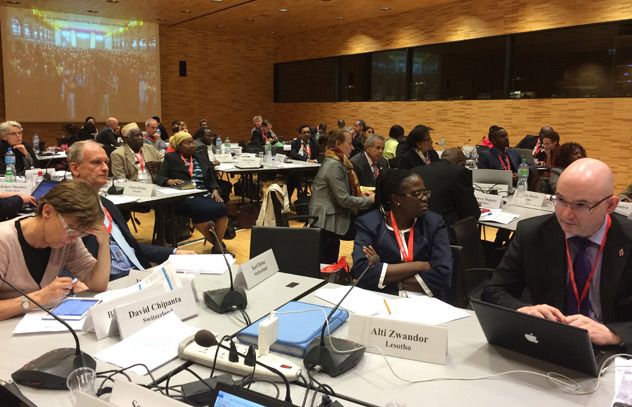

Meeting participants. Credit: UNAIDS
Debrief
What will it take to virtually eliminate sexual transmission of HIV by 2030?
11 April 2014
11 April 2014 11 April 2014Despite the significant decline in new HIV infections over the last decade, there is a need for a new phase of HIV prevention, with greater focus, innovation and accelerated and sustained action towards globally agreed targets. To re-energize global commitment to HIV prevention and make recommendations for action UNAIDS convened a global HIV prevention meeting in Geneva, Switzerland from 10-11 April 2014.
Participants
The meeting brought together National AIDS Council managers from 14 of the countries most affected by HIV, UN system staff, selected civil society representatives, key partners and experts.
Key messages
- In 2012, about 2 million new adult infections occurred, most of them in key populations and in young people, especially young women in Africa.
- The tools exist to significantly reduce new infections in the coming years, and virtually eliminate sexual transmission by 2030.
- For national prevention efforts to be optimised, they need to effectively operationalise combination prevention, re-invigorate strategies which work like condom promotion and services for key populations, and adopt and integrate innovations such as Pre-Exposure Prophylaxis (PrEP), cash transfers and new devices for male circumcision.
- New media tools need to be leveraged for mass awareness.
- New forms of community mobilization need to be explored
- Countries and partners need to review their strategies, define prevention targets beyond 2015 and allocate the resources to achieve them.
Quotes
"Women and girls are the most affected--to reach them and prevent new infections we need combine different biomedical, behavioral and structural approaches including economic and gender empowerment programmes."
"Involve young people in prevention- come and enter our world. We do not want to be passive recipients of interventions."
"We need a more useful understanding of sex, in addition to moral, legal, partisan, religious and ideological prescriptions to reduce new HIV infections."
"We successfully curbed the epidemic in Zimbabwe in the early days—we welcome this meeting because we know that challenges and opportunities are different today."
"Community structures, civil liberties and service access might not be enough to curb the epidemic among men who have sex with men but they are a requirement for preventing new HIV infections. We also need new tools like Prep and treatment."



